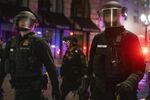Portland police leadership has authorized officers to cover their names and badge numbers while policing protests, potentially creating new issues for protesters who want to identify officers who have mistreated them.

A Portland police officer, right, covers their nametag during a protest against police brutality and racial violence June 15, 2020. Police leadership says officers can cover their names, but protesters fear it will make identifying officers who have mistreated them more difficult.
Jonathan Levinson / OPB
For over a week, Portland Police officers have been allowed to tape over their name tags with personnel numbers assigned to them by the city. During the nightly protests against police brutality, officers have been spotted with these single and double-digit numbers scrawled over tape and printed on stickers on their uniform.
Former Chief Jami Resch authorized the change before stepping down, according to police spokesperson Terri Wallo-Strauss.
Wallo-Strauss said Resch made the decision after officers were allegedly “doxxed,” the term for when personal information, such as home addresses or cellphone numbers, is discovered and released online.
“The reason is our officers were being doxxed, and their safety and that of their families is paramount,” Wallo-Strauss said. “They can still be identified internally by the number displayed if needed.”
The police bureau declined to answer specific questions about the incidents of doxxing.
Related: Activists Push Back Against Good Protester-Bad Protester Narrative
Asked for the order from Resch, the bureau released an email from Commander Erica Hurley with the bureau’s transit division.
“Please let your officers/sergeants know as soon as possible they may cover their name tags on their uniforms with a label containing their BHR Personnel Number (PRN) number,” read the June 6 note. “Also have them write their number on light colored tape on the back of their helmets.
Protesters who want to file a complaint against a Portland police officer can take that personnel number to the Independent Police Review, the agency that investigates misconduct allegations against the police. The agency has a list of staff’s personnel numbers and can match those with names, according to agency director Ross Caldwell.
If the complainant was directly involved in the incident, the officer’s name will be sent to them in a letter, Caldwell said. But if the person filing the complaint is a third party — for example, somebody who watched an incident on video — there would be an investigation, but the officer’s name would not be passed on to the person who prompted it.
Caldwell said the review agency is just starting to receive complaints with these numbers instead of names. Since protests against police brutality began more than two weeks ago, the agency has received dozens of complaints about interactions with police during protests.
Caldwell said he had mixed feelings about the rule change, about which Resch informed him before she stepped down. While the police review agency does receive complaints about officers that do not include their names or badge numbers — something especially likely to occur in fast-changing situations such as a protest — the anonymity is now intentional and potentially makes it more difficult to trace a complaint back to a specific officer.
“It might not be as intuitive for someone to remember the number on somebody's head as opposed to just looking at their name tag and be like, ‘Oh it's Officer Jones.'” he said.
But Caldwell also said he recognized the chief’s concerns about officers’ safety and said the agency is in a trial period to see if the rule change creates new challenges.
“If we get to a situation where we think it is harder to identify these officers because they have a number on their helmet and on their chest, as opposed to just a name tag on their chest, that’s something we’re going back to the police bureau and the mayor, the police commissioner, and say, ‘Hey you’ve got to balance some things — you have two competing things that are concerning, you’re going to have to make a decision,’” he said.
Related: Portland City Council Approves Budget Cutting Additional $15M From Police
Portland is not the first city in which police officers say their personal information has leaked online. Last week, the Associated Press released details of a document by the U.S. Department of Homeland Security that said top police officials in cities such as Boston, New York, Atlanta and Washington, D.C., have had private information — emails, phone numbers, and home addresses — published on the internet.
While individual officers in some of these cities have reported covering their name tags and badge numbers, none of these police departments have reported taking the steps made by the Portland Police Bureau: allowing them to ditch the identification altogether in favor of an internal number.
Deputies from the Multnomah County Sheriff's Office, who are assisting in policing the protests, have made no changes to how their names are displayed, according to a spokesperson from that office.
Kelly Simon, the interim legal director for Oregon’s chapter of the American Civil Liberties Union, said she’d learned of the new rules for Portland police on social media. Accounts have surfaced over the last week of confused protesters asking officers why their names are covered. Simon said that while she appreciated the need to protect officers' privacy, there needs to be an easy way for protesters to ID police.
“In no circumstances should there be anonymous police troops in our streets,” Simon said.
